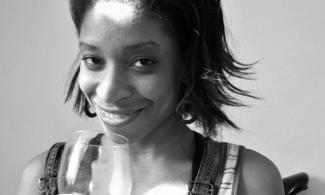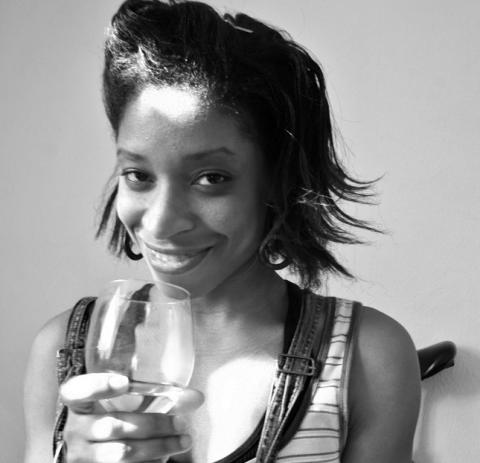
Irenosen Okojie is a freelance arts project manager, writer and author of Butterfly Fish (a book which will be published in 2015) and a collection of short stories. She is currently Writer in Residence for TEDxEAST END.

A risk taker, she quit the study of law to explore her passion for the arts and literature. She is a regular contributor to the Guardian and the Observer, where she lends her support to writers from ethnic backgrounds. Okojie was selected for the Flight mentorship scheme for young writers run by Spread the Word. Her work has been published in Kwani literary magazine, Ether Books, Arcadia Books, Fiction Uncovered and Flipped Eye. Until recently, she was the Prize Advocate for the 2014, SI Leeds Prize She is represented by Ellise Dillsworth Agency. She took some time to speak to Tundun Adeyemo from www.blackandoutspoken.com.
What project are you working on?
I am working on my novel and a short story collection.
Is there anything you have done in the past to prepare you for where you are now?
Just reading voraciously and writing as much as possible!
Tell us how it felt to have been published by guardian.co.uk?
It’s a lovely thing, you get to reach a broad audience writing on topics you’re passionate about.
You write in defense of black and ethnic minority groups often is there a personal reason for this drive.
There’s an affinity there since I am from one of these groups. There are lots of talented black and Asian writers just waiting to be given a break. Of course, writing and getting a book published is difficult no matter your race anyway. Not only can producing the work be quite arduous but when so few people in the industry who look like you are picked up, you wonder why that is. The publishing industry can be very slow to change. It’s an unfair playing field, not just racially but class wise too and that’s why I’ve spoken about it.
Does your sense of justice lie in a passion for equality or in an ideal?
Probably more so for equality as ideals are subjective, also because sometimes the reality of a situation can be quite far removed from the ideal, so what you try to do is go for middle ground and address that imbalance however small or large your contribution might be.
Your sense of political fairness covers a lot of your work. Is this the trend you think other authors should take?
I think you have to take the path that feels honest and authentic to you. There’s no set way of doing it and that’s part of the beauty of it. Authors should write and talk about subjects they are passionate about. Hopefully things will fall into place. These are some of the issues I care about and have discussed with other writers and friends. It has happened organically.
You have had a colorful and varied professional career how would you describe your success: luck or hard work?
I’d say a combination of both. Sometimes, you’re lucky enough to be in a position where everything just aligned at the right time. But I’ve also had my fair share of turmoil and disappointments too. There was a period for a few years where I just had job after job I didn’t enjoy. I had quit pretty quickly if something wasn’t for me too. Then, I accidentally fell into working in the arts. Something clicked and made sense, plus people in the arts are a different kind of breed. They’re laid back, open and they generally work very hard. Being around the creativity was inspiring and exciting to me.
Visibility is the key for black writers....can more established writers support new writers in anyway?
Definitely. I think if you’re a generous writer, you’ll find ways of supporting others, either by using platforms you’re connected to or creating opportunities yourself. You could start a writer’s group, join a mentoring programme, and give feedback and advice to emerging writers. There are lots of things people can do.
How did you get into writing? If you were not a writer, what else would you be?
I’ve always loved books. I read avidly as a kid so writing felt like a natural progression even though it was in the background. I kept diaries and wrote poems a lot. I joined a writing development programme and that really helped kick start my journey. I studied law at university for a bit but then quit that because the books were too expensive and I kept falling asleep during lectures! If I wasn’t a writer I’d have loved to be an editor of some experimental magazine with global perspectives, like Trace magazine http://www.trace212.com/ or maybe a location hunter for films.
Are ebooks the future?
I think ebooks are definitely part of the future, more publishers have started to recognise that and are incorporating it into their models.
What books are you reading now?
Sometimes, I have this habit of reading several books at the same time. I’m currently reading Alex Wheatle’s Liccle Bit, Cupcake Brown’s A Piece Of Cake and Margaret Atwood’s The Edible Woman.
What books are you expecting to buy this Christmas?
I tend to buy my books from charity shops. That way I have no set author in mind. It’s fun to rummage and discover books randomly.
Who is your favourite author and why?
Too many! There are just too many to pick one favourite but I do love Gabriel Garcia Marquez, Chinua Achibe, Buchi Emecheta, Margaret Atwood, Toni Morrison, Alice Hoffman, Walter Mosley and many others.
Is there a profound reason behind your work?
Like many writers I love stories. There’s something magical about literature. It’s transformative and allows you to express yourself, to have a voice. It’s really powerful.
Could you describe a lesson you have learnt from any book you have read?
I picked up Maya Angelou’s I Know Why The Caged Bird Sings in my teens.
Her life story blew my mind but also the honesty of her voice. There was something really sexy about her creative power, that she used it to forge her own path and that her experiences made her interesting, even the bad ones. It unlocked something in me.
Are African authors celebrated enough in your own opinion in the UK?
International African authors are celebrated but I don’t think UK based African authors are celebrated enough.
Is there a message for black emerging writers out there?
Just keep writing if you’re passionate, consistency does pay off even if it doesn’t feel like it is for a while. Find those support networks to keep you going, they make a big difference. Go out and meet other writers,get feedback and most importantly, keep going. There is a space for diverse voices.
Where is the best place for our readers to find you?
I am on irenosenokojie.com. You can also find me on Twitter at @IrenosenOkojie
Tundun Adeyemo